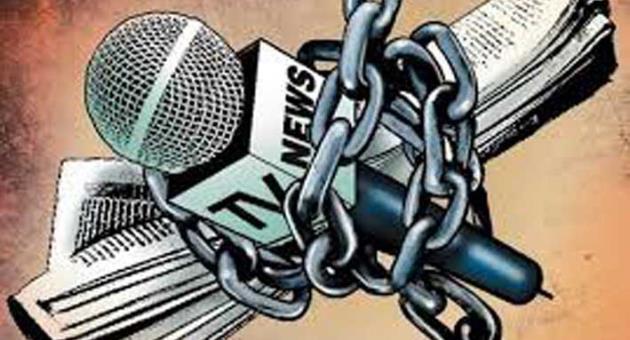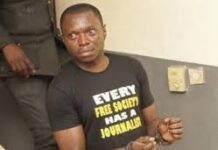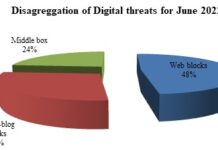
Nigeria Union Journalists, Chairman, Lagos State Chapter, Dr. Qasim Akinreti; Human rights Lawyer, Mr. Femi Falana (SAN); Director of IPC, Mr. Lanre Arogundade and Executive Director of Wole Soyinka Centre for Investigave Journalism, Mrs. Tunrayo Alaka during the IPC’s commemoration of this year’s International Day to End Impunity for Crimes against Journalists in Lagos
• 88 media workers killed
The unlawful detention, constant harassment, threats to life and intimidation media practitioners face across the globe is becoming more worrisome, and global, local groups and organisations have called on governments at all levels to ensure the safety of journalists. A report by UNESCO shows an increase in the number of journalists killed around the world in the last 12 years, saying this is a critical time to ensure journalists’ safety, as over 1,000 journalists were killed, with only 10 per cent of those responsible for the killings facing any trial.While marking the International Day to End Impunity for Crimes Against Journalists, the United Nations and other bodies charged governments, media rights organisations and professional bodies to ensure there is safety for journalists at all times.
While delivering the UN Secretary General, Antonio Guterres’ speech at a programme organised by Safety and Security Watch to commemorate the day, Country Director of UN office, Lagos, Mr. Ronald Kayanja, said the UN was concerned about Nigerian journalists, as the country goes into election year, and called on journalists to desist from reporting fake news considering the country’s sensitive and fragile nature.
According to the UN boss, “About 88 journalists have been killed this year so far. In just over a decade, more than 1,000 journalists have been killed while carrying out their indispensable work. Nine out of 10 cases are unresolved, with no one held accountable. Female journalists are often at greater risk of being targeted, not only for their reporting, but also because of their gender, including through threat of sexual violence.”
Guterres lamented that it was outrageous and should not become the new normal, adding, “When journalists are targeted, societies as a whole pay a price. I am deeply troubled by the growing number of attacks and the culture of impunity. I call on governments and the international community to protect journalists and create the conditions they need to do their work.”
He commended journalists for their resilience despite intimidation and threats and noted, ‘Their work and that of their fallen colleagues remind us that truth never dies. Neither must our commitment to the fundamental right to freedom of expression. Reporting is not a crime. Together, let us stand up for journalists, for truth and for justice.”
Guest lecturer and professor of School of Communication, Lagos State University, Ojo, Lagos, Lai Oso, said the emergence of different violent groups across the world has posed a big threat not only to the lives of journalist but everyone else. Oso lamented that government’s constant move to control the media was a big challenge to the profession, saying, “journalism exists with the society, hence its constraints emanate from the society; if they are subdued, there will be a lot of compromises.”
While speaking on ‘Safety of Journalists and the Challenge of Impunity in Nigeria: Lessons and Actions,’ Oso insisted that media rights organizations, Nigerian Guild of Editors (NGE), and Nigeria Union of Journalists (NUJ) must ensure the safety of journalists, noting, “We fail to understand that attack on journalists is attack on our democracy and freedom. The NGE and NUJ are not doing enough to protect journalists; there is the issue of poor remuneration, with salaries not being paid at all. Journalists are not able to hold government accountable or invest in investigative journalism because at the end of the day, it is not worth risking their lives.”
He further lamented the inadequacy of the security system as well as the national security where law enforcement agents are given powers to harass journalists: “not one case of journalists killing case has been resolved. Of course, the case of Mr. Jones Abiri’s detention is still unresolved. ThisDay newspaper’s office was burnt by Boko Haram and so many other cases. All media workers are under siege today; they are under tremendous pressure, and I would say it is an attempt by the ruling power to control the media.”
Oso advised that everyone must be educated on how to protect themselves irrespective of their profession, adding, “There is need for a reorientation of security agents to know the importance of journalists to any society, and see the sanctity of life as cardinal. On the other hand, journalists must always ask if the story is more important than their life.”
Also, a representative from Safety Consultants & Solutions stressed that as government looks to fight corruption, the media should be its credible partner in the fight and advised that all sectors must collaborate to end impunity for crimes against journalists in Nigeria.
In a similar vein, International Press Centre (IPC), in partnership with the Lagos State Council of Nigeria Union of Journalists (NUJ), held a tweet conference and media roundtable to mark the day in Lagos. Human rights lawyer and activist, Mr. Femi Falana, who was guest speaker, stressed that any freedom taking from anyone must be justifiable by law, adding, “The press must defend the freedom it has fought for” while speaking on ‘The law as an instrument to defend online rights of journalists and press freedom’, said journalists have a duty to protect their profession.
















